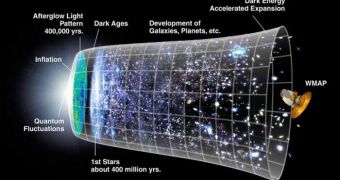One of the main critiques brought forth against the Big Bang theory is, simply put, that something cannot come from nothing. Our instinct tells us that that's impossible, and this is one of the main foundations of people's beliefs in supreme beings. But our instincts should not always be trusted.
Anthropologically speaking, our instincts evolved in order to help us adapt to a very specific environment, the African savanna, where our first ancestors lived. This happened some 150,000 years ago, and many things have changed since.
Our instincts did not evolve to help us understand complex physics problems or the Universe, they appeared so that we could survive. This is one of the main reasons why we should now trust the laws of physics above our own instincts, when it comes to figuring out how the Universe appeared.
Many people who believe in a divine power argue that the Big Bang could have not occurred without a supreme being intervening. They simply cannot conceive how something may have come out of nothing, and then evolve into what the entire Cosmos is today.
This inability to grasp such an idea is not necessarily an issue of education (although that plays a significant role), but rather the result of applying instincts specialized in a certain field to a completely unrelated field. This leads many to believe that a divine power is necessary to explain the Big Bang.
But astrophysicists say that introducing such a being in the equation is not necessary to explain how everything appeared. “The Big Bang could've occurred as a result of just the laws of physics being there. With the laws of physics, you can get Universes,” said Alex Filippenko.
The expert, who holds an appointment as an astrophysicist at the University of California in Berkeley (UCB), made the statement on June 23, at the SETICon 2 conference, held in Santa Clara, California.
The key to understanding how everything appeared is looking at quantum fluctuations. These phenomena occur at subatomic scale, where the influence of quantum effects far outweighs that of conventional forces. Quantum fluctuations often produce matter and energy out of nothingness.
“Quantum mechanical fluctuations can produce the Cosmos. If you would just, in this room, just twist time and space the right way, you might create an entirely new Universe. It's not clear you could get into that Universe, but you would create it,” added another panelist, Seth Shostak.
“So it could be that this Universe is merely the science fair project of a kid in another Universe. I don't know how that affects your theological leanings, but it is something to consider,” further said the expert, who is a senior astronomer at the Search for Extraterrestrial Intelligence (SETI) Institute.
Filippenko says that the announcement was not intended to argue that a god does not exist. That may very well be the case. “I don't think you can use science to either prove or disprove the existence of [a] god,” he concluded, quoted by Space.

 14 DAY TRIAL //
14 DAY TRIAL //